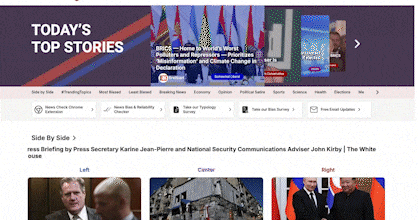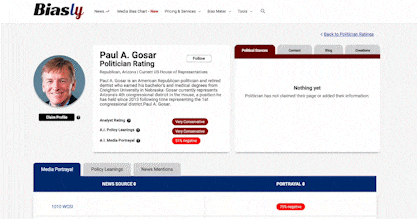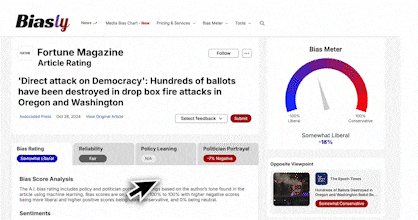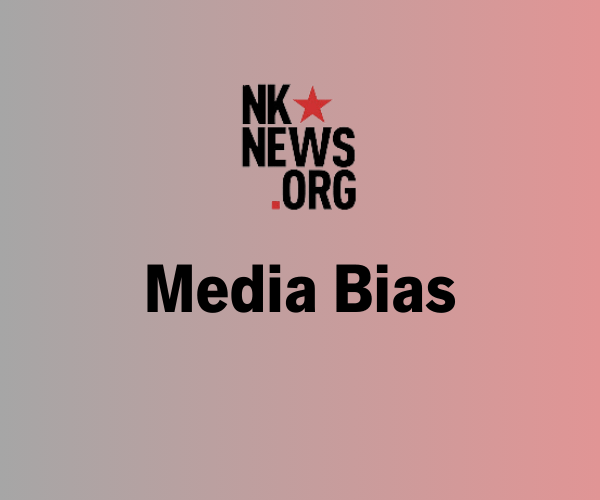
Established in 2010, North Korea News is an independent and privately owned news source that focuses on events in North Korea. It provides authoritative news, as well as opinion and analysis articles. Its staff is located in the U.S., Europe, and the Republic of Korea. North Korea does not oversee the sources’s content.
We will analyze several of the news source’s articles and determine if it has a political bias. We hope that doing this will confirm if North Korea News is biased, as well as point out the elements of media bias in general.
How Does Biasly Rate News Sources?
Biasly’s algorithms produce bias ratings to help provide multiple perspectives on given articles. Biasly has analyzed 200,000+ news articles from more than 3,200 news sources through our A.I. technology and team of political analysts to find the most factual, unbiased news stories.
Biasly determines the degree of political bias in news sources by using Biasly’s Bias Meter Rating, in which Biasly’s team analyzes media sources’ reliability and bias and produces three scores, a Reliability Score that measures the accuracy of media sources; an A.I. Bias Score, evaluated by A.I.; and an Analyst Bias Score evaluated by political analysts. These scores are rated based on seven rating metrics including Tone, Tendency, Diction, Author Check, Selection/Omission, Expediency Bias, and Accuracy. These metrics help our analysts to determine the political attitude of the article.
Our A.I. machine-learning system employs natural language processing and entity-specific sentiment analysis to examine individual articles and determine their bias levels. By analyzing the key terms in an article such as policies, bias phrases, political terminologies, politicians, and their nicknames, the algorithms can rate the attitude of the text. Bias scores range from -100% and 100%, with higher negative scores being more liberal and higher positive scores being more conservative, and 0% being neutral.
Is North Korea News Politically Biased?
Biasly’s rating of North Korea News contains two scores: one from A.I., and one from Biasly’s analysts. The A.I. classified North Korea News as ‘Center-Left’, while the Analysts classified it as ‘Somewhat Conservative’, meaning that this source’s political standing is somewhere between centrist and conservative. The analysts’ scores derive from an average of at least 15 articles, with each being reviewed by a liberal, conservative, and centrist analyst. Meanwhile, the A.I. generates a score by measuring the source’s positive and negative views of certain political topics.
According to Biasly, North Korea News is somewhat biased. Other resources rated North Korea News as more Center-leaning.
Before we begin, we need to discuss bias. Bias is a natural function of humans, and we can express it both consciously and unconsciously. Bias is one of the most fundamental forms of pattern recognition in humans. This isn’t to lower the bar and say that “all things are biased,” but to explain the process in which we may come to trust certain news organizations that display patterns of coverage.
On the media’s part, there is an incentive to retain audiences, encourage them to purchase subscriptions, and rate products positively. Bias is a two-way street, people want to see news stories about things they care about, and the media needs viewers to continue their operations. This creates a positive feedback loop that influences what stories are covered and from what perspective. This also explains the actions of more liberal news organizations.
Analysis of Bias in North Korea News Online Articles
To analyze the bias of any news source, multiple elements of its articles must be observed: tone, diction, author, tendency, and expediency bias. Tone refers to the writer’s attitude, which is determined by the writer’s choice of words, and diction is defined as these word choices. Meanwhile, the metric “author” focuses on the author’s views based on their past articles or social media activity. The tendency also measures the tendency of instances of bias and tone and its level of occurrence within the article. Lastly, expediency bias is an article’s first impression, which is formed by its headline, images, or summary, and reveals whether or not it has certain political views.
Diction involves the use of words that are meant to stir emotion in readers. For example, North Korea News’s “North Korean clinics lack medicine and knowhow to treat childhood disease: UN” states:
“The U.N. agency also assessed ‘inadequate knowledge and capacity of medical professionals on protocols for the management of malnutrition and childhood illnesses.’ Jerome Sauvage, a former U.N. aid coordinator in North Korea, told NK News that the staff’s admission to shortages does not paint an optimistic picture of the health situation in the country.”
The fact that people, some of which are children, in North Korea are struggling with illnesses and malnutrition causes readers to be concerned and saddened for them.
Meanwhile, tone can be used to display particular views and attitudes. For instance, the same article explains:
“…UNICEF ‘identified insufficient supplies of medicines, drugs, vaccines and medical consumables at the facility level,’ according to the report…Jerome Sauvage, a former U.N. aid coordinator in North Korea, told NK News that the staff’s admission to shortages does not paint an optimistic picture of the health situation in the country.”
The description of how North Korea lacks medical supplies creates a sense of urgency because it is demonstrated that they are in need. The phrase “admission to shortages” also has a negative tone and displays the poor health conditions in North Korea.
The second article from North Korea News that will be examined is “Tensions rise as another top DPRK official blasts Seoul over US-ROK drills”, which Biasly rated as Somewhat Conservative.
A critical tone is created when the author uses negative language surrounding the drills:
“…North Korean leader Kim Jong Un’s sister Kim Yo Jong denounced the drills for a second time this month.”
The word “denounced” could prompt readers to dislike the drills; Kim’s strong disapproval may place the drills in a bad light for readers, who are not yet informed on the issue.
However, a more neutral tone is made when the author describes comments from the ROK and the South Korean government:
“…the South Korean government told reporters that the joint drills are defensive in nature and carry no hostile intentions…”
In contrast to the negative language used toward the drills before, this section of the article actually uses positive language that portrays them not as a threat, but rather harmless. This causes readers to view the drills through a more positive lens. The choice to acknowledge comments from those on the other side of this issue also results in an informative tone that relays all the facts rather than focusing on one side.
However, a more formal tone is made when the author addresses comments from the ROK and the South Korean government:
“’Escalation of military tension on the Korean Peninsula does not help anyone,’ the ROK government said.”
“’The government emphasized that in order to meet peace and stability and develop inter-Korean relations, a dialogue between South and North Korea should resume as soon as possible,’ the South Korean government said.”
The choice to include comments from those on the other side of this issue results in an informative tone that relays all the facts rather than focusing on one side.
The same set of quotes also has an urgent tone; the ROK and South Korea both stress the need to stop this growing tension between the Koreas. It also emphasizes a need for North and South Korea to communicate on the issue.
Diction is another element seen throughout this article. For example, the article begins by stating,
“Kim Yong Chol, North Korea’s senior official in charge of South Korea affairs, slammed Seoul on Wednesday morning for pushing ahead with planned U.S.-ROK military drills.”
Similar to Chung’s use of the word “denounced”, her use of the term “slammed” reveals that the drills have been perceived in a negative manner by certain people, which prompts readers to perceive them negatively as well.
The author, Chaewon Chung, has been labeled as Somewhat Conservative by Biasly. This rating is given by Biasly’s analysts, who determine authors’ political leanings by observing information such as their articles or social media.
Chung’s other articles have a mix of biased and unbiased titles. For instance, the title of her article “New US ambassador to South Korea to arrive in Seoul next month: Source” simply states the fact that a U.S. ambassador to South Korea will arrive in Seoul, rather than expressing any opinions on the issue. However, other titles have biases against North Korea. An example of this is the title “Efforts to stop North Korea from acquiring nukes a ‘collective failure’: IAEA”. Here, there is an implication that North Korea should not possess nukes; the fact that North Korea has the nukes despite opposition is described as a “failure”, and is placed in a negative frame.
As a Somewhat Conservative news source, according to Biasly’s analysts, the publications of North Korea News also have a tendency of exhibiting mostly Center to possibly Right-leaning biases.
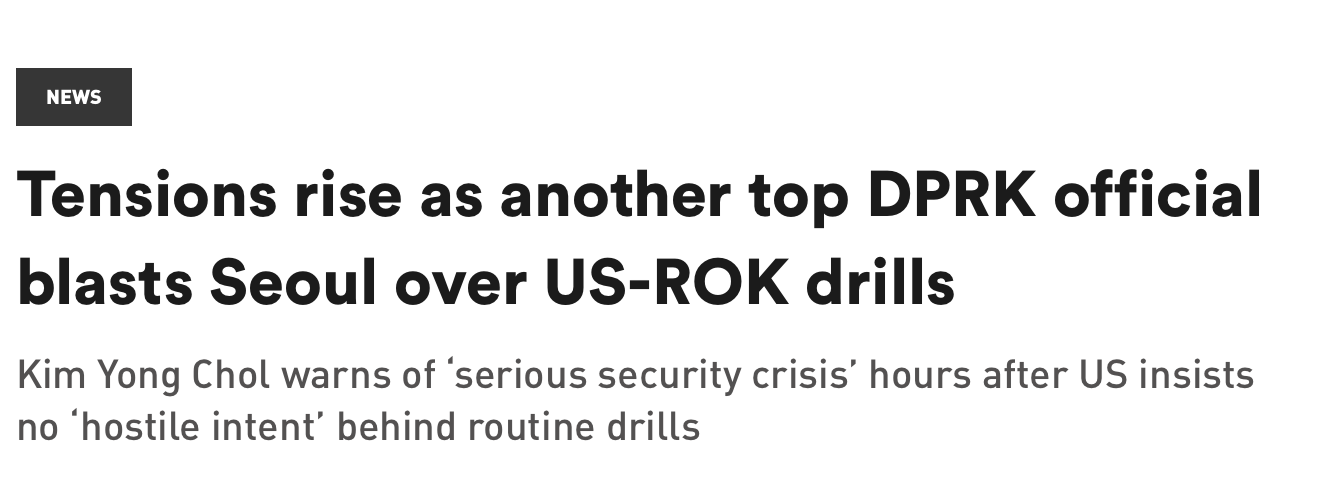
Source: North Korea News
Finally, there is an evident expediency bias against South Korea. The caption under the title states, “Kim Yong Chol warns of ‘serious security crisis’ hours after US insists no ‘hostile intent’ behind routine drills.” This immediately creates the impression that this article will express negative views toward South Korea and its decision regarding the drills.
While this article was rated as Somewhat Conservative by Biasly, biases can vary amongst authors and articles, even if they are from the same organization. The uncertainty of what biases may be found demonstrates the necessity of being able to identify signs of bias, such as tone, diction, tendency, author, and expediency bias.
Analysis of North Korea News Opinion Articles
Before analyzing North Korea News’s opinion articles, we must identify the difference between reporting and opinions. Reporting is neutral, gives readers facts from other sources, and allows them to form their own opinions independently. Opinion articles, however, allow authors to express their personal views on certain topics. Reporting prioritizes objectivity, while opinion articles permit subjectivity.
One opinion article from North Korea News is “North Korea is teaming up with China and Russia to violate human rights”. The title itself shows bias, as the phrase “violate human rights” reveals that the author holds a negative view of North Korea, China, and Russia’s actions. Putting this criticism of the three countries in the beginning of the article implies that the author will not be objective.
However, another story, “Book review: A deep dive into the obscure world of North Korean Animation”, has an objective title, and focuses on giving information about North Korean animation rather than expressing any particular views. Therefore, this opinion article is less biased than the other.
The final opinion piece we will observe is “Book review: Jargon weighs down an impressive study of gender in North Korea”. This title is biased since it shows the author’s dislike of the book’s jargon, as well as his positive view of the study overall. The article discusses the author’s personal likes and dislikes about the book, rather than relaying objective information about it.
Although we only discussed three opinion articles, it can be inferred that authors’ opinions can notably influence North Korea News’s stories. Therefore, it is important that readers can identify both objective and subjective news.
Who Owns North Korea News?

Chad O’Carroll; Source: North Korea News
North Korea News is owned by NK Consulting Inc. Its founder and CEO is Chad O’Carroll. While neither of their political affiliations are confirmed, it can be inferred that they have centrist and conservative views, given the standing of North Korea News. North Korea does not have any authoritative positions within North Korea News. However, there are anonymous sources inside North Korea who assist with North Korea News’s articles. The North Korea News website also has a page titled “Ask a North Korean”, on which the outlet’s North Korean colleagues answer questions from readers about what it is like to live in North Korea.
How to Evaluate and Uncover Bias
It can often be difficult to tell if the news you read is biased. If you have settled on a news website, it’s usually because you trust the information you are gaining. Unfortunately, many trust the information they are reading because it confirms what they already believe. This is referred to as “confirmation bias.” It is important to challenge your beliefs and get third-party verification that what you are hearing is the full story. This is why we recommend using Biasly to compare different news stories side-by-side using our bias ratings to figure out what both sides think of a political issue.
While North Korea News has been identified as standing something between centrist and conservative by Biasly’s analysts, readers must remember that the biases in each article are different, and that North Korea News also publishes liberal-leaning stories. Another influence on bias is the type of article written, as general news reports are less biased than opinion articles. Since it is always uncertain how much bias is in any news article, it is important to use Biasly’s News Check and learn about the biases in your news.






















